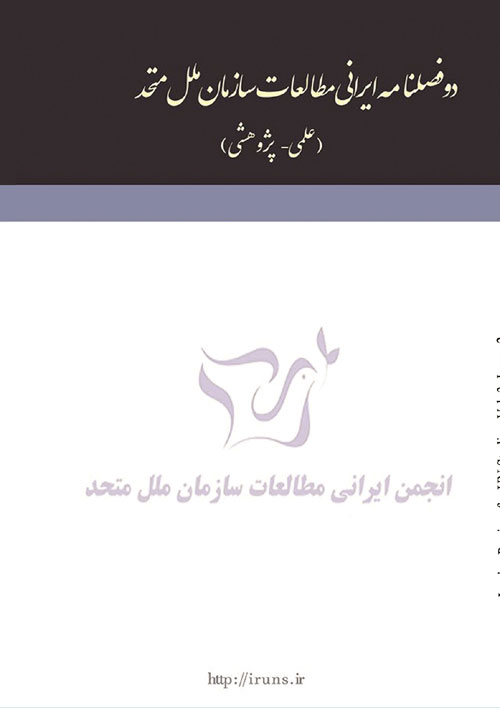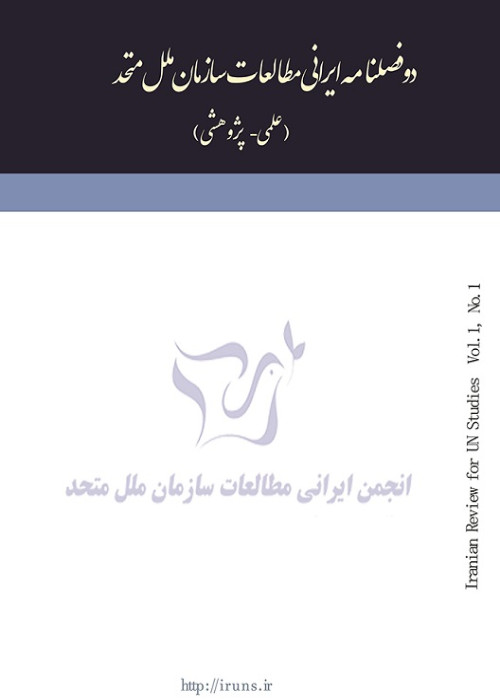فهرست مطالب

The Iranian Review for UN Studies
Volume:3 Issue: 2, Summer and Autumn 2020
- تاریخ انتشار: 1401/06/16
- تعداد عناوین: 4
-
-
صفحات 1-32سیاست قضایی دیوان بین المللی دادگستری در ساحت حقوق بشر غالبا میان سیاستی آزادمنشانه و سیاستی محافظه کارانه در نوسان بوده اساسا، سبب چنین نوسانی ریشه در ساختار حقوق بین الملل دارد؛ ساختاری که در مرحله گذار از وضعیت حاکمیت محور(raison d'etre) به وضعیت جامعه مشترکات بین المللی (raison d’humanité) سیر میکند. پرسش آن است که در ساحت حقوق بشر، دیوان بین المللی دادگستری در کدام طیف از مسایل موضوعی سیاست آزادمنشانه و یا در مقابل سیاست محافظه کارانه در پیش گرفته است. این مقاله کوششی در جهت پاسخ به این پرسش است و در این راه رویکردی انتقادی در پیش گرفته است (رویکرد عدالت محور). برای چنین ارزیابی، ما ابتدایا طیفی از مسایل موضوعی از قبیل حمایت دیپلماتیک و حقوق بشردوستانه را تحلیل میکنیم که در آن دیوان غالبا رویکری آزادمنشانه داشته است. سپس، به سراغ مسایل موضوعی از قبیل مصونیت قضایی دولتها و صلاحیت دیوان خواهیم رفت که در آن دیوان غالبا رویکردی محافظه کارانه داشته است.کلیدواژگان: سیاست قضایی، حقوق بشر، متدولوژی تفسیری، سیاست قضایی آزادمنشانه، سیاست قضایی محافظه کارانه، ساختار وستفالیایی، جامعه مشترکات بین المللی
-
صفحات 33-74همگنی ارزشی منطقه ای می تواند منجر به ایجاد یک نظم عمومی منطقه ای گردد که عناصر سازنده آن مجموعه ای از قواعد مطلق و تخطی ناپذیر موسوم به «قواعد آمره منطقه ای » می باشند. با این حال، به واسطه نداشتن هر گونه جایگاه در حقوق بین الملل موضوعه و کمبود رویه دولت، تنها از طریق بکارگیری رویکردی به شدت ذهنی گرایانه می توان ضوابط تعریف و پیامدهای حقوقی قواعد آمره منطقه ای را معین نمود. علاوه بر این، این گونه از قواعد با یکی از عناصر اساسی قاعده آمره یعنی جهانشمولی نیز مغایرت دارند. در سطح عملی هم قواعد آمره منطقه ای می توانند اثر منفی بر روابط حقوقی فرامنطقه ای داشته باشند. در مقابل، مطابق با حقوق بین الملل موضوعه (به طور خاص معاهدات منطقه ای حقوق بشری)، قواعد تخطی ناپذیر خاصی مانند ممنوعیت مجازات اعدام در رژیم اروپایی حقوق بشر وجود دارند که قادر به ایفای کارکردهای معین شده برای قواعد آمره منطقه ای می باشند در حالی که وضعیت مفهومی منسجم تر و پیامدهای عملی پذیرفتنی تری دارند. به طور خاص، به واسطه اینکه قواعد تخطی ناپذیر خاص کاملا منبعث از حقوق بین الملل موضوعه و رویه دولت ها هستند، تعیین ضوابط تعریف و پیامدهای حقوقی آنها به مراتب عینی تر است. همچنین، آنها فاقد هر گونه اثر مختل کننده بر روابط حقوقی فرامنطقه ای هستند زیرا قواعد تخطی ناپذیر خاص به لحاظ مفهومی با قواعد امری تفاوت دارند که مانع از مغایرت ماهیت آنها به عنوان حقوق خاص با جهانشمولی قواعد امری حقوق بین الملل عام می گردد.کلیدواژگان: قاعده آمره منطقه ای، قواعد امری، قواعد تخطی ناپذیر، حقوق بشر، حقوق خاص
-
صفحات 75-101برنامه جامع اقدام مشترک که به اختصار برجام نامیده می شود، مسیر سرمایه گذاری شرکت های خارجی چند ملیتی، بزرگ و کوچک در بخش های مختلف بازار و زیرساخت های ایران را پس از رفع تحریم های سازمان ملل متحد، اتحادیه اروپایی و ایالات متحد آمریکا، هموار نمود؛ اگرچه، این دوران به دلیل خروج دولت ایالات متحد آمریکا از برجام و وضع مجدد تحریم های ثانویه، موقتی و زودگذر بود. بلافاصله پس از وضع مجدد تحریم های آمریکا، شرکت های خارجی تعهدات قراردادی خود را خاتمه دادند و یا تعلیق کردند بدون اینکه عواقب حقوقی آن را در نظر بگیرند. از آن زمان، وضعیت برای شرکت های ایرانی متفاوت تر شده است؛ شرکت های خارجی از همکاری با ایران منع شده اند و نقل و انتقالات بانکی، به دلیل تحریم های ایالات متحد آمریکا، توسط بانک های خارجی متوقف شده است. باید توجه داشت، شرکت های خارجی نمی توانند از مسیولیت خود به دلیل خروج ایالات متحد آمریکا از برجام و اعمال مجدد تحریم ها شانه خالی کنند. تعهدات قراردادی طرف/ طرفین یک قرارداد با اشخاص ایرانی باید محترم شمرده شده و اجرا شود؛ در غیر این صورت، شرکت های خارجی باید تمام خسارات و ضرر و زیان های وارده را جبران نمایند. از آنجا که تحریم های ایالات متحد آمریکا قابل پیش بینی بوده است، به ویژه برای شرکت های اروپایی، بنابراین آنها نمی توانند به دفاع فورس ماژور متوسل شوند. مقررات انسداد اتحادیه اروپا، نداشتن حسن نیت، و فقدان تلاش بایسته برای اجرای تعهدات در خصوص استثنایات و معافیت های بشردوستانه نشان دهنده عدم امکان استناد به فورس ماژور است. بنابراین، شرکت های ایرانی باید بر اساس بندهای حل و فصل اختلاف مندرج در قراردادهای خود با طرف های خارجی، و سایر سازوکارهای قانونی مطالبات خود را از شرکت های خارجی مطرح کنند تا اقدامات آنها به ایجاد رویه ای مشخص برای مقابله با شرایط حال و پیش روی ناشی از تحریم های ثانویه منجر شود.کلیدواژگان: تحریم های اقتصادی، تعهدات قراردادی، برجام، مقررات انسداد اتحادیه اروپایی، فورس ماژور، دیوان بین المللی دادگستری، پایبندی بیش از حد
-
صفحات 103-131آخرین مرحله شیوع ویروس آنفولانزا، همه گیری جهانی است که به واسطه آثار و پیامدهای مختلفی که دارد، تهدیدی برای صلح و امنیت بین المللی محسوب می شود. شورای امنیت سازمان ملل متحد در قطعنامه شماره 2532، پاندمی کووید -19 را به عنوان تهدیدی پیش روی حفظ صلح و امنیت بین المللی قلمداد کرده است. به طور کلی در باب امنیت دو رهیافت وجود دارد: رهیافت امنیت ملی و رهیافت امنیت انسانی. هر کدام از این دو رهیافت ابزار و شیوه های خاص خود را برای مدیریت بحران همه گیری جهانی در اختیار دارند. در قسمت اول مقاله به تعریف و اثرات همه گیری جهانی خواهیم پرداخت. در قسمت دوم، امنیتی شدن سلامت بررسی می شود. در قسمت سوم نیز به ارزیابی چگونگی مدیریت بحران های سلامت از جمله همه گیری جهانی توسط دو رهیافت امنیت انسانی و امنیت ملی می پردازیم. بر مبنای این پژوهش، به نظر می رسد که رهیافت امنیت انسانی به واسطه ماهیت مشارکتی که دارد برای مدیریت بحران همه گیری جهانیبه عنوان تهدیدی جهانی کارآمدتر خواهد بود.کلیدواژگان: همه گیری جهانی، امنیتی شدن، امنیت ملی، امنیت انسانی، سازمان ملل متحد
-
Pages 1-32The judicial policy of the International Court of Justice (ICJ or the Court) towards human rights has often oscillated between judicial activism and judicial restraint. The cause of the ICJ’s oscillation is mainly rooted in the structure of international law, which is in the stage of transition from sovereignty (raison d’Etat) to international community (raison d’humanité). The question raised is that in which range of legal issues the Court has often displayed a judicial activism or judicial restraint vis-à-vis human rights. This article will endeavour to respond to this question from a critical perspective. In doing so, we will first examine a range of legal issues such as diplomatic protection and international humanitarian law in which the Court has often displayed a judicial activism. We will then analyze a range of legal issues such as jurisdictional immunities of states as well as the Court’s jurisdiction where it has often displayed a judicial restraint.Keywords: judicial policy, Human rights, methodology of interpretation, judicial activism, judicial restraint, Westphalian structure, International Community
-
Pages 33-74A regional value-based homogeny could lead to the formation of a regional public order constituted by certain non-derogable absolute norms called “regional jus cogens”. However, due to the absence of any footing in positive international law and scarcity of state practice, only an extremely subjective approach could determine the defining criteria for regional peremptory and its legal consequences. Furthermore, the concept of regional jus cogens conflicts with an essential element of jus cogens paradigm i.e., universality. On a practical level, regional peremptory norms could adversely affect trans-regional legal relations. However, this article argues that under positive international law (particularly regional human rights conventions), there exists special non-derogable norms (such as the prohibition of death penalty in European regime of human rights) which are capable of performing functions assigned to regional jus cogens while benefiting from a more cohesive conceptual status and entailing more plausible practical consequences. In particular, as special non-derogable norms are firmly grounded in positive international law and state practice, determining their defining criteria and legal consequences would be more objective. Furthermore, they do not entail any major disruptive impact on transregional legal relations as special non-derogable norms conceptually depart from jus cogens paradigm preventing any conflict between lex specialis nature of these norms and universality of peremptory norms of general international law.Keywords: regional jus cogens, Peremptory Norms, non-derogable norms, Human rights, Lex specialis
-
Pages 75-101An acronym for the Joint Comprehensive Plan of Action, the “JCPOA” paved the way for multinational as well as major and small foreign companies to invest in different potential areas in the Iranian market and infrastructure right after the United Nations, the European Union and the United States have lifted sanctions. However, these were temporary and the U.S. Administration withdrew from the nuclear deal and re-imposed its secondary sanctions against Iran. Immediately after the re-imposition of U.S. sanctions, foreign companies have terminated or suspended their contractual obligations without considering the legal consequences. Since then, the situation for Iranian companies is quite different; foreign companies are prohibited from working with Iran, and banking transactions are halted by foreign banks owing to U.S. sanctions. In fact, they cannot evade their responsibility under the withdrawal of the U.S. from the JCPOA and the re-imposition of sanctions. Contractual commitments of the parties to a contract with Iranian entities must be respected and enforced; otherwise, they must compensate all losses and damages. The Defense of force majeure cannot be invoked, particularly for European companies, since U.S. sanctions were foreseeable. European Union’s Blocking Statute, lack of good faith, and the due diligence for the fulfillment of their obligations as to humanitarian exemptions and exceptions indicating force majeure could not be upheld here too. Therefore, Iranian companies shall raise their claims based on dispute settlement clauses stipulated in their contracts with foreign parties and other legal mechanisms in order to establish a concrete procedure to deal with on-going and future situations regarding secondary sanctions.Keywords: Economic Sanctions. Contractual Obligations, JCPOA, EU Blocking Statute, Force majeure, International Court of Justice, Over-compliance
-
Pages 103-131Pandemic is the last phase of influenza viruses’ circulation which may have various impacts that threatens the maintenance of international peace and security. In its Resolution 2532, the UN Security Council described the COVID-19 pandemic as a likely threat to international peace and security. It is generally accepted that there are two approaches to security: national and human security. Both of these approaches have their own tools for managing a pandemic crisis. In the first part of this paper, the definition and various impacts of a pandemic will be discussed. The second part will address the securitization of health. In the third part, the paper will discuss how national and human security approaches would manage health crises including a pandemic. The paper recommends that in order to manage pandemic crisis as a global threat, the human-security approach would be much more effective due to its co-operation-oriented natureKeywords: Pandemic, Securitization, National Security, Human Security, UN


